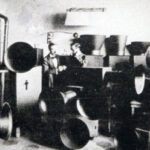Giacomo Puccini (1858–1924),
Scossa elettrica—marcetta brillante (1899);
Filippo Tomasso Marinetti (1876–1944);
Zang Tumb Tumb: Adrianopoli, Ottobre 1912 (1914);
Francesco Balilla Pratella (1880–1955), from
La guerra (1913);
Alfredo Casella (1883–1947), from
Cinque Pezzi (1920);
Aldo Giuntini (1896–1969), The India Rubber Man, foxtrot (1930);
Luigi Russolo (1885–1947),
From
The Art of Noises (1913) and
Risveglio di una città (1913–14);
Giuseppe Blanc (1886–1969) (Oxilia),
Il commiato (1909);
Franco Casavola (1891–1955),
From
Hop Frog, ballet (1925);
Silvio Mix (1900–27),
Profilo sintetico musicale di F.T. Marinetti (1923);
Zez Confrey (1895–1971),
Dumbell (1922)
; Nick LaRocca (1889–1961),
Original Dixieland Jazz Band, Livery Stable Blues (1917);
Dino Olivieri (1905–1963),
Tornerai (1933). The program features a rare screening of
Nino Oxilia's
silent film
Rapsodia satanica (1917), accompanied by The Orchestra Now performing
Pietro Mascagni's score,
and George Méliès's silent film,
le cake-walk infernal, (1903), accompanied by
Blair McMillen, piano.
The festival's second weekend opens with a concert featuring
The Orchestra Now, among others. Glorifying modernity in an attempt to liberate Italy from the weight of her past, the Italian Futurist movement saw the rise of composers including
Francesco Pratella,
Franco Casavola, and
Luigi Russolo. Their music spanned a wide stylistic range, Pratella's betraying little sign of the radical views he espoused in print, while Russolo's – and the custom devices on which he performed it – introduced a truly original new aesthetic that brought everyday noises into the concert hall. The program will also include
Puccini's
Scossa elettrica, written for a celebration of scientist
Alessandro Volta; his favorite jazz tune,
Dumbell, by
Zez Confrey; and selected popular songs of the day. To conclude the concert, Bard presents a rare screening of the silent film
Rapsodia Satanica, a female spin on the Faust legend from
Nino Oxilia, accompanied by a live performance of its original score, which marks the only film music by Pratella’s teacher,
Mascagni.
Make a Night of It! Enjoy
Night-Out packages, available for select Bard Music Festival performances.

